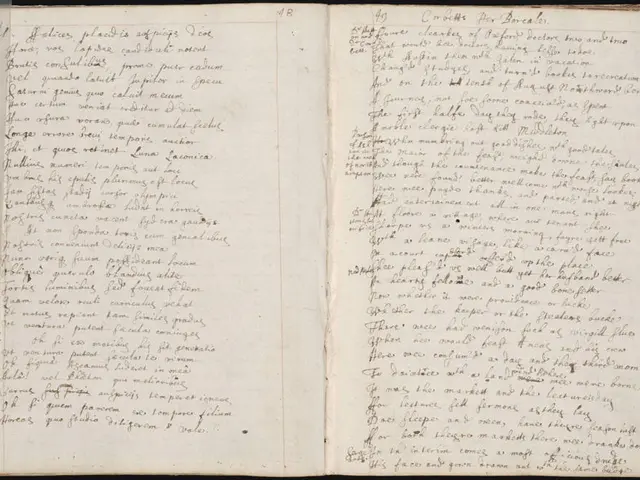German Proverbs and Their Interpretations: A Compendium of 75 Well-Known Sayings
In the rich tapestry of language and literature, German proverbs stand out as a testament to the enduring spirit of the German-speaking world. Rooted in early modern literature, oral traditions, and older Germanic/Norse wisdom sayings, these proverbs serve as distilled wisdom conveying German values such as pragmatism, perseverance, and communal ethics.
One of the most significant figures in the collection and composition of German proverbs was Friedrich von Logau, a poet from the early modern period. His works, such as Erstes Hundert Teutscher Reimensprüche (1638) and later expanded Deutscher Sinn-Getichte (1654), compiled thousands of sayings that reflect the everyday experiences, moral lessons, and social observations of his time.
These proverbs often carry layers of meaning that embody German values like prudence, diligence, realism, and community spirit. They functioned as accessible wisdom for the common people and the educated alike, encoding lessons about conduct, fate, hardship, and relationships. They resonate with the ethos of practical living and serve as moral or practical guidelines that offer insight into how people navigated life’s challenges.
Beyond Germany proper, regional cultures influenced by Germanic peoples, such as the Frisians living in coastal Germany and the Netherlands, also used proverbs to underscore values like resilience, contentment, and the strength of spirit, emphasizing their close relationship with nature and community. This suggests that German proverbs reflect the landscape, social environment, and historical experiences of the speaker communities.
In a broader Germanic cultural context, these proverbs are a continuum of ancient oral wisdom traditions, comparable to the Old Norse Hávamál—a collection of proverbial verses attributed to Odin that shares thematic elements of moral and practical advice dating back to as early as the 9th or 10th century. This connection illustrates how proverbial wisdom in German culture is part of a wider Northern European heritage emphasizing ethical conduct and reflection on life’s realities.
German proverbs are more than just folk sayings; they are cultural artifacts that preserve historical worldviews, societal values, and daily life experiences, transmitted orally and later in literary form. They helped shape and reinforce social norms and collective identity, making them an invaluable lens for understanding German culture and values throughout history.
Here are a few examples of the proverbs and their meanings:
- "Do not use any prior context" translates to "It is not difficult to be a father, but it is very difficult to be a father."
- "The German people are the descendants of the Germanic tribes."
- "Only death has no solution, we must make the most of our life" translates to "Totgesagte lënger."
- "We must be honest in life" translates to "Ehrlich währt am längsten."
- "Out of sight, out of mind" translates to "Aus den Augen, aus dem Sinn."
- "Knowing how to cook can help us make the person we love fall in love" translates to "Liebe geht durch den Magen."
- "Old age always catches up with us" translates to "Alter geht vor Schönheit."
- "God helps those who get up early, getting up early is a good habit" translates to "Morgenstund hat Gold im Mund."
- "Great achievements don't come from nowhere" translates to "Es ist noch kein Meister vom Himmel gefallen."
- "Knowing how to rest will allow us to be much more effective at work" translates to "In der Ruhe liegt die Kraft."
- "Knowing how to prevent can help us make a bad future less" translates to "Einsicht ist der erste Weg zur Besserung."
- "Something that has been seen coming for a long time" translates to "Lange Rede, kurzer Sinn."
- "It is better to achieve something in the long run than to never achieve it" translates to "Besser spät als nie."
- "It is better to give than receive" translates to "Geben ist seliger denn Nehmen."
- "Everyone can get lucky at any given time" translates to "Auch ein blindes Huhn findet mal ein Korn."
- "What we like will happen in due time" translates to "Probieren geht über studieren."
- "Preparation will allow us to achieve our goal" translates to "Ordnung ist das halbe Leben."
- "As time goes by we will see how events happen" translates to "Kommt Zeit, kommt Rat."
- "We must not get ahead of events" translates to "Man soll den Tag nicht vor dem Abend loben."
- "Something that seems very good may actually not be" translates to "Übermut tut selten gut."
- "As we would say in Spain: 'lies have very short legs.'" translates to "Lügen haben kurze Beine."
- "When we urgently need something, we sharpen our wits" translates to "Not macht erfinderisch."
- "We should not get involved in other people's affairs" translates to "Reisende soll man nicht aufhalten."
- "Proverbs are a source of wisdom that have been important for certain ancient societies."
- "Good news always comes together" translates to "Aller guten Dinge sind drei."
- "Something insignificant but that happens many times, can make a big change in the long run" translates to "Steter Tropfen höhlt den Stein."
- "A proverb that is also used a lot in Spanish-speaking countries" translates to "Unkraut vergeht nicht."
This enduring tradition reveals how Germans have historically used proverbs as a concise and memorable means to communicate important life lessons, thereby sustaining cultural continuity and offering insight into their worldview.
- The collection of German proverbs, such as those by Friedrich von Logau, delve into emotions and psychology, focusing on moral lessons and social observations that provide guidance in lifestyle and education-and-self-development.
- As educational tools, these proverbs reflect the values and beliefs of German culture, highlighting resilience, prudence, diligence, and community spirit, offering a means of self-reflection and personal growth in the journey of life.







